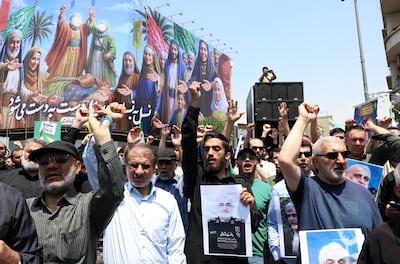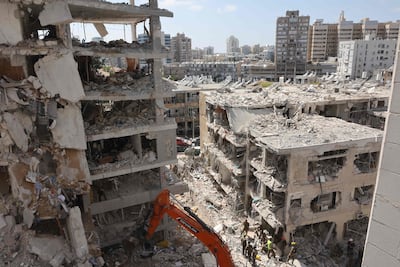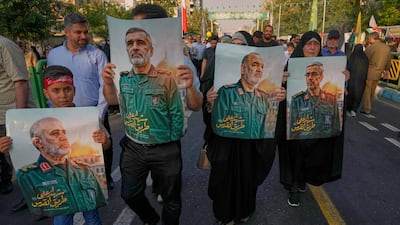In less than 48 hours, Israel killed a tranche of Iran’s top military brass in its multipronged attack. They included the commander in chief of the Islamic Revolutionary Guard Corps, Iran’s most powerful military force, the IRGC’s aerospace commander, responsible for missile and drone programmes, and the chief of staff of the armed forces.
Iran's supreme leader Ayatollah Ali Khamenei swiftly announced replacements, likely wishing to avoid a power vacuum and establish a chain of command for Iran’s retaliatory attacks, which began hours after Israel’s first strikes on Friday morning.
Israel trumpeted the killings as a major blow against Iran and its alleged nuclear ambitions. However, the deaths of experienced leaders who were believed to have urged caution behind the scenes could also push more aggressive voices to the fore in Iranian military circles.

IRGC chief, Maj gen Hossein Salami, was replaced by Brig Gen Mohammad Pakpour, another long-standing senior Revolutionary Guard. Majid Mousavi, already deeply involved in Iran’s ballistic missile and drone programmes, became the group’s aerospace chief, replacing Amir Ali Hajizadeh.
Army chief of staff, Maj Gen Mohammad Bagheri, was replaced by Maj Gen Amir Hatami. Lt Gen Gholamali Rashid, formerly commander of Iran’s Khatam Al Anbiya combatant command headquarters, was replaced by Maj Gen Ali Shadmani.
Israel also killed nine scientists involved in Tehran’s nuclear programme, including Fereydoon Abbasi, a former head of the country’s Atomic Energy Organisation.
Some of the military leaders are of a similar age and experience to those they replaced. Like his predecessor Maj Gen Salami, Brig gen Pakpour is a veteran of the Iran-Iraq War, the 1980-1988 conflict that killed more than one million people in both countries, leaving an indelible mark.
The deaths of so many senior military commanders in such a short space of time was “not without effect", but also said they were replaceable, a senior Iranian government official said.
“You saw that in less than 24 hours, new officials started their work in these areas, which shows the existence of capable people,” the official told The National.
Their thinking is not hugely different from those they replaced, he believes. “The intellectual field of the new people is entirely similar to the people we lost.”
Israel’s attacks were aimed at degrading and destroying Iran’s nuclear programme, which is believed by Prime Minister Benjamin Netanyahu’s government to be aimed at quickly producing a weapon. Iran has always denied it seeks nuclear armament, saying it wants to continue uranium enrichment for what it says are peaceful agricultural and scientific purposes.
It will take weeks to gauge the effectiveness of Israel’s continuing campaign, which has also targeted ballistic missile launch sites to curb the impact of Iran’s retaliation, which is also continuing.
According to the Washington DC-based Institute for the Study of War, Israel conducted a “decapitation campaign” against Iran’s military leadership. Mr Khamenei’s appointment of successors means the disruption is “temporary and limited", the institute said in an analysis note on Friday, although it added that continued Israeli strikes on missile infrastructure may limit their abilities to carry out retaliation.
Rhetorically, the new military commanders have swiftly come out with statements vowing revenge on Israel similar to remarks made by their predecessors after previous strikes on Iranian interests and counter-attacks last year.
“This series of operations will continue on a larger scale and more devastatingly than before until the criminal and aggressor Zionist enemy completely regrets [its actions],” Ali Shadmani said on Sunday.
So far, that response has been more devastating than previous direct Iranian attacks on Israel. At least 13 people have been killed as of Sunday afternoon, and hundreds injured, Israeli authorities have said.
Buildings in Tel Aviv and other areas of central Israel have been destroyed. Both the intensity of the continuing Israeli operations against Iran, and the loss of commanders who advocated for so-called “strategic patience” could lead to more intense escalation, analysts believe.

According to a political observer in Iran, those killed in the past 48 hours were among commanders who prevented a previous operation that another part of the military wanted to organise against Israel a few months ago.
“Rashid and Bagheri etc, were among the main Iranian commanders who believed that direct military conflict and tension with Israel should be avoided as much as possible,” he told The National. “For example, that Iranian counter-attacks should be more symbolic as much as possible, and deterrence should be demonstrated rather than enforced.”
More widely, as waves of killings forces replacement and promotion of younger men in Iran’s military, a new generation without the experience of the Iran-Iraq War, and its devastating consequences, will come to the fore.
A war involving Iran could give less experienced leaders the same sort of clout that older war veterans have, according to Serhan Afacan, director of the Istanbul-based Iranian Studies Centre.
“Although this does not necessarily mean that they will drag the country into war if they take power, it can be said that they will be less flexible in finding common ground with the US and the West in general,” he told The National.
The impact on Iran of Israel’s continuing strikes could deepen if attacks on energy infrastructure that started overnight escalate. On Saturday night, the Israeli military struck a refinery at the giant offshore South Pars gasfield, and Tehran's Shahran oil depot, in an escalation of its operations from military and nuclear sites to the energy sector.
Iran is already unable to produce enough electricity to prevent rolling power cuts in the summer months, or sufficiently supply gas for winter heating. Any further erosion of its energy supplies could have a dramatic impact and stoke anger among the population.
Even Iranians who oppose their government have condemned the Israeli attacks on their country, seeing them as attacks on Iranian sovereignty and resulting in civilian fatalities. Many Iranians circulated pictures of Parsa Mansour, a padel player, and Parnia Abbasi, a poet in her twenties, both killed in the strikes.
Parvaz Park in the north of the Iranian capital was filled with more people than usual on Saturday night, as crowds gathered to watch missiles being launched from Iran to Israel, the political observer in Tehran told The National.
People there “had various different feelings", the man said. “The part that is against the Islamic Republic was even upset about the Israeli attack on Tehran. In their contradictory feelings, they would not mind if Iran targeted Israel with force that night.”


